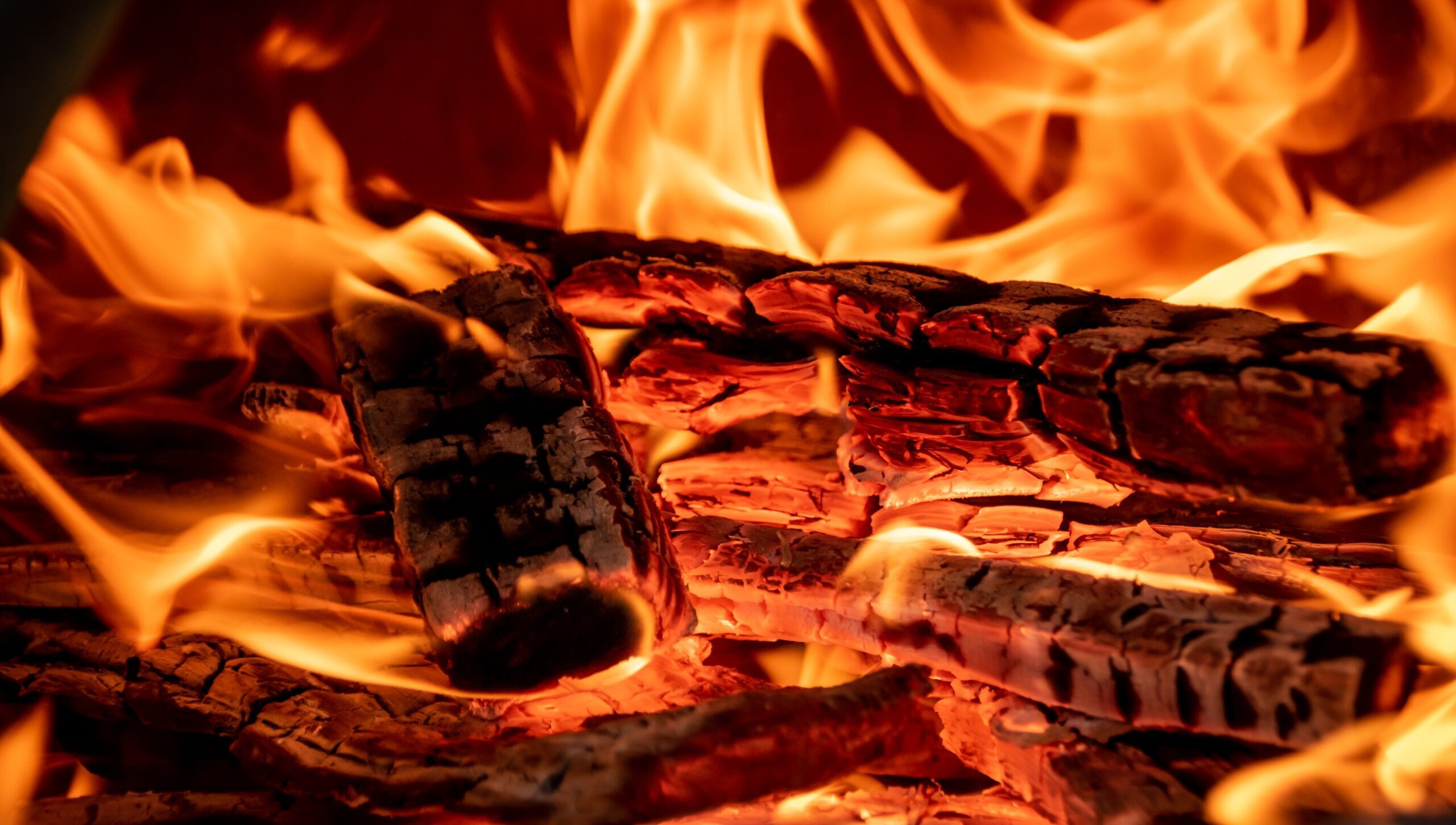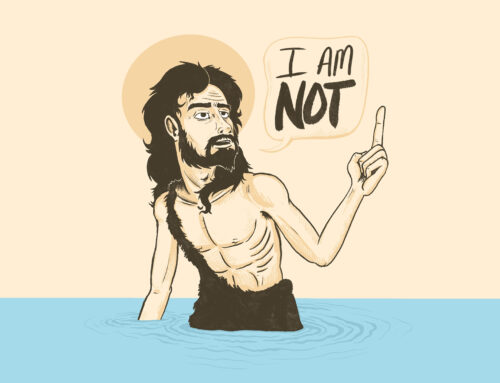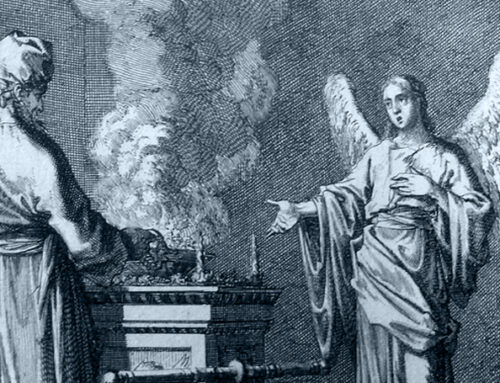Now I’m not a pyromaniac by any means — but I do love fire. It’s beautiful and mysterious. I love watching things burn up and melt in the white hot center of fire. On a cold winter night, there’s nothing quite so comforting and captivating as a roaring bonfire.
Simply put: Fire is cool.
If you like fire, too, then you probably noticed that in our second reading today, St. Peter told us that in the end — at the coming of the day of God, when all things are summed up and the world comes to a rumbling close — “everything will be dissolved in flames and the elements will be melted by fire.”
Now given this future fiery fact, St. Peter exhorts us point blank that while we still have time on this planet, while we still air in our lungs, and the sun is still shining through these beautiful stained glass windows, and we have any strength left… then we should “be eager to be found without spot or blemish before God” — “at peace” with the Lord.
What does St. Peter mean by that?
Well, to put it bluntly: He’s telling us that in the end, everything that is not of God will be burned to a crisp. Anything not in perfect union with the Lord will be absolutely and totally incinerated. Everything and everyone, therefore, must be purged and prepared for the coming of what Peter calls a “new heavens and a new earth.” Nothing of the “old” — no spot or blemish, not a SPECK! — can be brought along for the ride into this New Creation. We must let go of everything in order to receive the brand new Everything that God is preparing for us! It’s like what CS Lewis once said in his book, The Great Divorce:
If we insist on keeping Hell (or even earth) we shall not see Heaven: if we accept Heaven we shall not be able to retain even the smallest and most intimate souvenirs of Hell.
Nothing of Hell can even fit in Heaven. It’s too big. Too good. What we are awaiting is too amazing to admit any spot or blemish.
So in other words: Everything separated from God will be torched. It will all melt away. Don’t bother clinging to any of that low and earthly stuff.
Let it be burned now! Let yourself be purified now. Let there be a “Great Divorce,” if you will, between you and every attachment that holds you back from loving God, from living out your vocation faithfully, from being the father, the mother, the sister, the brother, the human being you were created to be! One way or another, it’s gotta go. As Jesus puts it: “If you’re right hand causes you to sin, cut it off!”
St. John of the Cross, one of the great mystics of our Tradition, offers us a beautiful image for what this process of becoming perfectly united with God looks like. He compares it to a fresh log being placed on a fire. In this analogy, we are the log — and God is the fire, which is fitting… Because Scripture tells us that “God is a consuming fire.” His love is white hot.
John starts off by saying that at first, the fire acts on the wood by drying it out. All the moisture is expelled from the log and it starts to smoke. Then, the fire begins to scorch the outside of the log — the bark begins to burn and get blackened by all the flames surrounding it.
John of the Cross says that this singing and scorching is what we experience when God draws near to us and we begin to take our relationship with Him seriously. That’s how it feels sometimes. It feels like God is drying us out… It feels like He’s burning us. And in fact, that’s exactly what He’s doing: He’s burning off all the exterior, superficial, worldly things in our life. We find that we must let go of all sorts of things that used to be enjoyable to us. We find that we’re called and invited to sacrifice things that we used to indulge freely in. And that process hurts! It’s not fun… it’s not comfortable at all.
The idea John of the Cross is going for here is that God is actually a loving and disciplining Father who is helping us to become untangled and detached from everything that isn’t Him, that isn’t God. Because ultimately — He wants to fill us with His own Life! He wants to transform us into the Divine Fire itself.
John goes on to say that after scorching and burning the exterior of the log, it’s then that the fire ignites the wood deep down within. It’s only then that the entire log begins glowing with the light and heat of the fire itself.
In a certain sense, the log becomes fire, because now it shares all the properties of fire. It is able to give off light and heat.
That is John’s beautiful image of the soul that’s ablaze with the love of God. It’s an image of the human person, radiant and alive with God’s own life. This is what St. Irenaeus meant when he said that the “Glory of God is a human being, fully alive.”
And where else do we see a human being fully alive — fully on fire — more clearly than in the Incarnation of the Only Begotten Son of God? In Jesus, we find Man fully alive in a definitive, and absolute way. He is a fiery and blazing log — fully lit with the Glory of God. In fact — He IS the glory of the Lord, the image of the Invisible God, come in the flesh. That’s what the story of Christmas proclaims: “Here is your God! Here comes with power the Lord GOD!”
And from the midst of the bonfire of His love, Jesus turns towards each one of us and says: “I have come to set the earth on fire, and how I wish it were already blazing! Follow me. Come and live in Me:
Live in my Fire.”
The Incarnation is a fire. It’s not a nice, comfortable, contained fire — a crackling little flame, kept safely within the bounds of a private fireplace that we can turn to whenever we feel like warming ourselves up a bit or when we’d like to make s’mores.
No — Christ comes to set the whole world on fire. He comes to set us on fire — He comes to turn us into fire itself!
Pope Benedict XVI once wrote that: “The fire which both burns and saves is Christ himself, the Judge and Savior. Before his gaze,” he says, “all falsehood melts away. This encounter with him, as it burns us, transforms and frees us, allowing us to become truly ourselves.”
That is to say: Jesus, the Son of God, came into our world, came in the flesh — was born on Christmas, lived, died on a Cross, and rose from the dead — so that we might be united perfectly to God. That’s what that Voice, crying out in the desert is making so much racket about:
“Prepare the way of the Lord! Fill in every valley! Level every mountain! Make the rugged land smooth, and the rough country, a broad valley… Prepare the way for your God! Prepare your heart! Make room for Him! He’s coming to catch you on fire!”
That’s not something we can do to ourselves. Christianity is not a self-help plan or a method of self-improvement. Rather, the Christian life is all about surrendering to the Lord’s action in our lives. It’s about falling in love with Him and with His Church. It’s about allowing ourselves to be placed like logs on the fires of His mercy, and so become more and more deeply and perfectly united with Him. He takes the initiative. He makes the first move.
And that, everyone — is the source of all our comfort! Listen again to those incredible words found in our first reading from the Prophet Isaiah: “Comfort, give comfort to my people, says your God.”
The only way to receive deep, abiding comfort, is to be on fire with the Love of God. The comforts of this world will not last. They will be burned up. They will melt. The only real comfort we have is God. So become like that log in the heart of the Fire. Submit to the long, slow, patient burn. Allow yourselves to catch fire deep down within.
Become Fire.





When you mentioned St. John of the Cross on Sunday I felt it was very timely – thank you. The devotion for the day prior in Fr. Gabriel of St. Mary Magdalen’s “Divine Intimacy” was all about St. J of C’s Graph of the Summit of Perfection – which very much echoes the sentiment of his analogy with fire and wood and your homily. Really drove the point home for me! Love the website by the way… I hear maybe 50-75% of the homilies owing to kids so it’s a good way to follow up and reflect. Glory to God!
“And the figure spoke thus:
I am the great and fiery power
who has kindled every living spark
and extinguished nothing mortal –
for I judge these things as they are.
In circling circles
with my upper wings
(that is, with Wisdom)
I fly around, ordaining all things rightly.
And I am also the fiery life of divinity:
I flame above the beautiful fields
and I glow in the water
and I burn in the sun, the moon and the stars.”
–St. Hildegard of Bingen